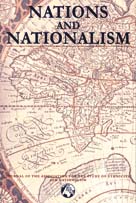Crossref Citations
This article has been cited by the following publications. This list is generated based on data provided by
Crossref.
Arnason, Johann P.
2000.
Approaching Byzantium: Identity, Predicament and Afterlife.
Thesis Eleven,
Vol. 62,
Issue. 1,
p.
39.
Kuzio, Taras
2001.
Historiography and National Identity among the Eastern Slavs: Towards a New Framework.
National Identities,
Vol. 3,
Issue. 2,
p.
109.
Järve, Priit
2002.
Two waves of language laws in the Baltic states: Changes of rationale?.
Journal of Baltic Studies,
Vol. 33,
Issue. 1,
p.
78.
Chudowsky, Victor
and
Kuzio, Taras
2003.
Does public opinion matter in UkraineΠThe case of foreign policy.
Communist and Post-Communist Studies,
Vol. 36,
Issue. 3,
p.
273.
Wellings, Ben
2003.
Britishness and the Failure of Australian Republicanism.
Studies in Ethnicity and Nationalism,
Vol. 3,
Issue. 2,
p.
35.
Kuzio, Taras
2003.
National Identities and Virtual Foreign Policies among the Eastern Slavs.
Nationalities Papers,
Vol. 31,
Issue. 4,
p.
431.
Tønnesson, Stein
2004.
Globalising national states.
Nations and Nationalism,
Vol. 10,
Issue. 1-2,
p.
179.
Mycock, Andrew
and
Loskoutova, Marina
2010.
Nationalizing the Past.
p.
233.
Tsurumi, Taro
2010.
“Neither angels, nor demons, but humans”: anti-essentialism and its ideological moments among the Russian Zionist intelligentsia.
Nationalities Papers,
Vol. 38,
Issue. 4,
p.
531.
Kalinin, Kirill
2017.
The Evolution of the Russian Elites' Perceptions of National Interests, 2012-2016.
SSRN Electronic Journal ,
Kuzio, Taras
2018.
Russian and Ukrainian elites: A comparative study of different identities and alternative transitions.
Communist and Post-Communist Studies,
Vol. 51,
Issue. 4,
p.
337.
Kalinin, Kirill
2018.
National Identity and National Interests of the Russian Elites, 2012-2016.
SSRN Electronic Journal,
Kuzio, Taras
2019.
Russian stereotypes and myths of Ukraine and Ukrainians and why Novorossiya failed.
Communist and Post-Communist Studies,
Vol. 52,
Issue. 4,
p.
297.
Kolstø, Pål
2019.
‘Is imperialist nationalism an oxymoron?’*.
Nations and Nationalism,
Vol. 25,
Issue. 1,
p.
18.
Curanović, Alicja
2020.
Guarding the Motherland’s Frontiers: The Russian Orthodox Church in the North Caucasus.
Problems of Post-Communism,
Vol. 67,
Issue. 6,
p.
446.
Curanović, Alicja
2020.
Przeznaczeni do wielkości! Poczucie misji w polityce zagranicznej. Przypadek Rosji.
Kuzio, Taras
2024.
Historical preparation and ideological legitimisation of the Russian invasion of Ukraine: a critical discourse.
Journal of Contemporary European Studies,
p.
1.
Curanović, Alicja
2024.
The Keeper of the Imperial Body: The Russian Geographical Society as an Entrepreneur of Imperial Nationalism.
Nationalities Papers,
p.
1.




